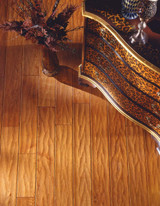5 Important Differences Between Laminate Flooring and Real Hardwood

How does laminate flooring Compare to real wood? We approached Hardwood vs. Laminate briefly a couple of years ago, but I'll go over some other basics to help you get this aspect of your floor hunt sorted out. Now, it could be a three way battle, as there are differences between the two main divisions of hardwood, solid and engineered, but in most of the categories I'll hit, they stick together as a team.
1. Installation Versatility
While many hardwood floors are nailed or glued down, both laminate and engineered hardwood can be installed as floating floors, so we're not talking about ease, and the variety of installation types wouldn't necessarily boost hardwood here. Each type of hardwood has one installation method, as does each type of laminate, and while rare, there are other methods of laminate installation as well. This is about location.
Solid hardwood should not be installed below ground level, called "below grade". It is too responsive to changes in the environment of a house, both temperature and moisture. It grows and shrinks the most of these floor types. This fights against its attachment to the floor by nails or glue.
Engineered hardwood can go into, let's say, a basement, but you do need to have the moisture levels checked, both in the floor and the walls.
The moisture content of the floor concrete can't be over 4%. You will need a moisture barrier, and this means that it is best to install the hardwood as a floating floor. Nails go through moisture barriers, and if you glue your flooring to a moisture barrier you haven't really installed your floor, you've just covered its bottom with plastic. Above grade, engineered hardwood can be glued to a concrete subfloor, which is not an option with solid, and since it can go over any very flat surface, it can be installed over some existing vinyl and tile.
Laminate flooring, which is almost always installed as a click together floating floor, can be put in any room in the house using whatever is its normal installation method. It can also go over pre-existing flooring, and it's even less responsive to the environment than engineered hardwood. Winner: Laminate flooring

Sound
Each of these floors has a flat, hard surface, but a floating laminate floor is not going to absorb the walking sound as well as a fully attached hardwood floor. There are various types and thicknesses of padding underlayment available which will help reduce this factor, but possibly not completely. The underlayment can only be so thick, you see. If it's too thick, you might actually disengage the locking mechanisms between planks as they push down into the padding when you walk. Hardwood has a less hollow sound as you walk over it. There is still some sound, obviously, and if you're in an upper level condo, where full sound-proofness is sometimes required for any floor you install above your neighbor, one of the best options is to lay a cork floor as your sound barrier, and float the hardwood flooring over it. Winner: Hardwood flooring

2. Durability
When chipped or dented, solid hardwood can be sanded down. Depending on how deep the gash, so can engineered hardwood. Both can also be filled with a wood filler and then re-stained to match the color. With laminate, it is much harder to chip the floor in the first place. It is scratch resistant, stain resistant, and wear resistant in ways not matched by hardwood. You cannot, I mean absolutely can not walk on a hardwood floor with high heels. You can on most laminates. But if there is damage, a whole plank must be replaced. Winner: Laminate, slightly. It's harder to hurt, but some would say harder to fix.

3. Longevity

Click the image to see the whole document, which looks quite thorough!
You should expect a laminate floor to last close to its replacement warranty period. Generally this will be about 15 years, with longer warranties for staining, fading and manufacturer defects. The National Association of Home Builders Study of Life Expectancy of Home Components, pictured (and available to see!) at the right, suggests 15 to 25 years. During this same period, you should expect no wear, no fading and no staining, things which cannot be guaranteed with hardwood, because there it all depends on how well the owner takes care of the floor. The lifespan of Engineered hardwood flooring is better, with ranges from 20-30 years to 40-80 years, depending on the make of the wood. While we at Floors To Your Home don't recommend it, some will sand and refinish their engineered flooring, but the number of times is limited based on how thick the top layer is. If you intend to do this, look for no less than 4mm on that top layer, and an aluminum oxide finish to help your first run of years last as long as possible before you break out the sander. Well kept solid hardwood can last over 100 years It can be sanded and refinished many, many times. Winner: Hardwood, especially solid.
4. Basic Upkeep
Hardwood flooring will usually need regular attention to its finish, whether via oiling, waxing or sanding and refinishing. Laminate needs to be swept, and very occasionally damp mopped. Winner: Laminate flooring, easy.
[caption id="attachment_1211" align="alignright" width="550" caption="The Real Thing"]
 [/caption]
[/caption]
5. Home Value
As beautiful as laminate flooring is, as durable, water resistant and family friendly, buyers generally know that it isn't actual hardwood. Because they float, the walk can feel cushiony, even "spongey". For value, laminate will give you a little boost over carpeting, but genuine hardwood flooring is the most reliable value adder. Also, while wide in variety, the only looks available with laminate flooring are those determined by the manufacturer. With hardwood, you can have a paint store mix you up any color of stain you want. Your buyer can sand and refinish to the color they like. If they don't like your rustic hand-scraped laminate floor, their only option (or yours) would be to replace it fully. Winner: Hardwood flooring
Scorecard
|
Laminate flooring Installation Versatility Durability Basic Upkeep |
Hardwood flooring Sound Longevity Home Value |
– – – –
David has written and made videos about flooring products and installation since 2011 at Floors To Your Home (.com), where he is also the PPC Manager, a Researcher, a Website & Marketing Strategy Team member, Videographer, Social Strategist, Photographer and all around Resource Jito. In my spare time I shoot and edit video, put together a podcast, explore film history, and mix music (as in ‘play with Beatles multi-tracks’). Connect with
W. David Lichty
Follow Team Floors To Your Home on Facebook

 Brown Tone
Brown Tone
 Unfinished
Unfinished
 Red Tone
Red Tone
 Golden Tone
Golden Tone
 Gray Tone
Gray Tone
 Light Tone
Light Tone
 Medium Tone
Medium Tone
 Dark Tone
Dark Tone
 Brown Tone
Brown Tone
 Red Tone
Red Tone
 Golden Tone
Golden Tone
 Gray Tone
Gray Tone
 Light Tone
Light Tone
 Medium Tone
Medium Tone
 Dark Tone
Dark Tone
 Brown Tone
Brown Tone
 Red Tone
Red Tone
 Golden Tone
Golden Tone
 Gray Tone
Gray Tone
 Light Tone
Light Tone
 Medium Tone
Medium Tone
 Dark Tone
Dark Tone
 Multi Color
Multi Color

